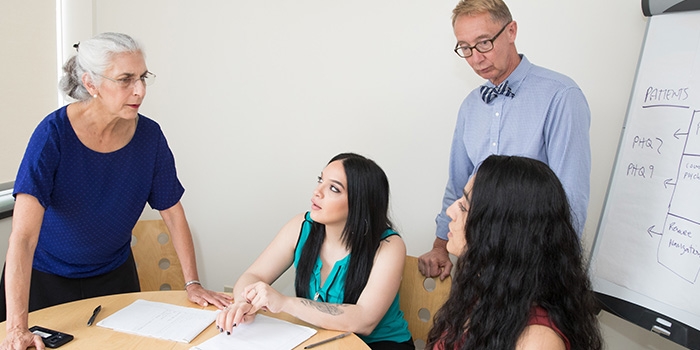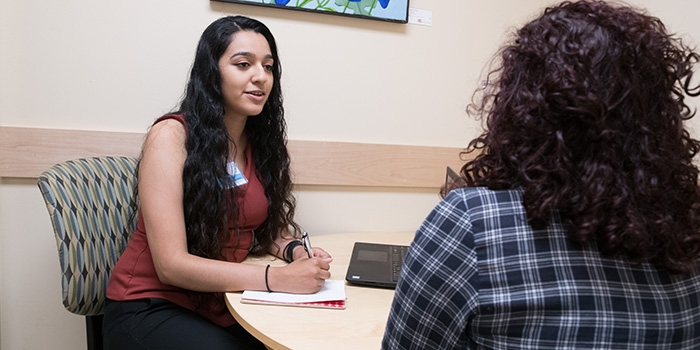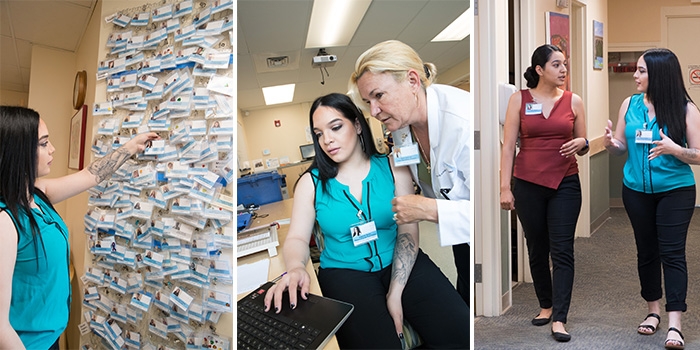RIC Responds to Shortage of Mental Health Professionals in R.I.
- News & Events
- News
- RIC Responds to Shortage of Mental Health Professionals in R.I.

Providence County designated a professional mental health shortage area. Grant-funded projects by RIC's School of Social Work focus on mental health workforce development.
Over 44 million adults in America have a mental health condition, yet mental health providers are so few in number that more than 24 million individuals are going untreated (State of Mental Health in America report, 2015).
Rhode Island is no exception. According to RIC Interim Dean of the School of Social Work Jayashree Nimmagadda, Providence County is one of the areas in the state designated a professional mental health shortage area by the U.S. Health Resources & Services Administration.
“Not only is the number of available mental health providers low, the number of facilities is low, so it’s hard to get a bed,” she said. “That means, if you’re having a mental health crisis, you may sit in an emergency room for a while.”
For the past five years, Rhode Island College’s School of Social Work has focused on mental health workforce development, building capacity within the state’s mental health service-provider system. Their work has been funded by two grants from the Health Resources and Services Administration in 2014 and 2017, and an additional grant was secured in 2019 from the Rhode Island Foundation, which allows the school to deliver preventative mental health services at Thundermist Health Center and the Rhode Island Free Clinic using clinical social work students.
“The project will expand prevention and treatment services for the Free Clinic’s uninsured adult patients and expand services at Thundermist for children and families,” said Nimmagadda.

The Rhode Island Free Clinic treats 2,500 uninsured, low-income adults, 70 percent of whom speak Spanish as their first language. Three Spanish-speaking, master’s-level social work students and a faculty member were placed at the site in May. Prior to their arrival, only two social work clinicians were counseling patients, and their caseloads were full. With additional funding from the Rhode Island Foundation, eight more interns will be placed at the clinic in the fall.
In addition to providing therapy sessions, interns address the life needs of those who come to the clinic. As soon as a client is determined eligible for services, they are screened for mental health issues such as depression and asked if they need food, transportation and legal assistance. If a need is stated, clients are referred to behavioral health.
“Our grant focuses on training clinical social work students to work as part of a primary care team,” said Nimmagadda. They interact with physicians as well as faculty and trainees from other higher education institutions.
Nimmagadda observed that “too often mental health providers and primary care providers work in silos,” and although most primary care providers can treat mental disorders, particularly through medication, it is best to refer patients to a mental health provider. Seventy-five percent of adult patients with depression see primary care providers, but only half are accurately diagnosed (National Center for Biotechnology Information, U.S. National Library of Medicine).
Nimmagadda also noted that people tend to prefer to visit their primary care provider over a mental health provider. When a referral is made to a mental health provider, only about half of patients follow through with making an appointment; as a result, many behavioral health problems go undetected, undertreated and/or untreated (National Institute of Mental Health).

That’s why the School of Social Work’s curriculum brings together medical students from Brown University, pharmacy students from the University of Rhode Island and nursing and social work students from Rhode Island College to work together on simulated medical cases.
“We’re trying to break the silos” Nimmagadda said. “In our simulation labs, we’re teaching future health-care workers how to work as interprofessional teams. When primary care providers work in collaboration with behavioral health providers they’re able to address social determinants of health that often impact physical health.”
RIC Professor of Social Work Deborah Siegel supervises the interns at the clinic. A passionate faculty member with her own private practice, Siegel also works on strategies to streamline the process in which the clinic’s patients are referred to the behavioral health team.
“A warm handoff is the gold-star method of getting patients in to see a behavioral health counselor,” Siegel explained. “In that way, the client doesn’t slip through the cracks. So, if your patient is sitting on the exam table and tells you she has PTSD, after her exam you can escort her to one of our interns for immediate attention.”
Sounds simple but more than 80 volunteer primary care physicians work at the clinic plus a large contingent of volunteer medical support staff. So, maintaining a smooth operational flow can be challenging.

The School of Social Work is also exploring the use of technology at the Rhode Island Free Clinic to screen for mental health and to treat adults with mental health concerns. Co-project director and RIC Assistant Professor of Social Work Warren Miller is developing an on-site telehealth suite, where patients can be screened using teletechnology and treated using teletherapy.
“Teletherapy is a modern form of health-care delivery,” Miller explained. “Rather than meet in person, a client can hold a video session with their counselor. This saves on travel time and transportation.”
“All you need to engage in teletherapy is a digital device with a front-facing camera,” he said. “By clicking on a secure link, you’re able to email, telephone or hold a video conference with your counselor. This new technology is really about creating access for people.”
And access runs both ways – should an intern or their patient be unable to make it to the clinic, a computer in the telehealth suite allows for video conferencing. The clinic’s telehealth suite is scheduled to launch in 2021.
“Through internships, we provide thousands of hours of mental health services to the State of Rhode Island and southeastern Massachusetts,” Nimmagadda reflected. “Each graduating B.S.W. student provides 480 hours of service and each graduating M.S.W. student provides 1,080 hours. We are also graduating well-trained social workers that are more representative of the population they serve. That means students of color who are bilingual or trilingual.”
Rhode Island College is developing community partnerships that expand services. They are extending workforce development to educate the next generation of clinicians. And they are furthering the health-system transformation work that is taking place in the State of Rhode Island. “Still, there is more that needs to be done, as access to mental health care is a serious concern for all Rhode Islanders,” said Nimmagadda.
